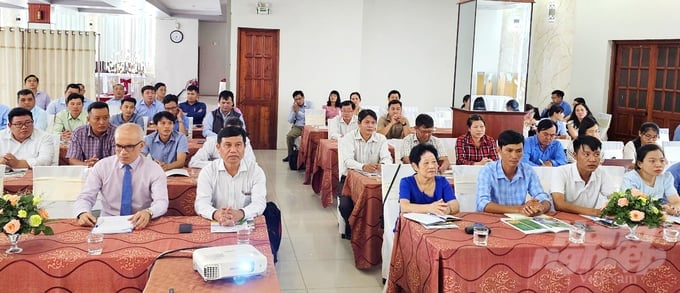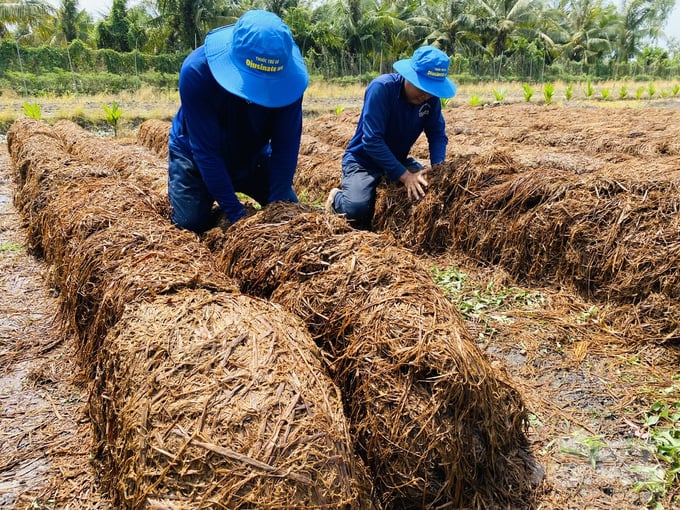November 27, 2025 | 02:11 GMT +7
November 27, 2025 | 02:11 GMT +7
Hotline: 0913.378.918
November 27, 2025 | 02:11 GMT +7
Hotline: 0913.378.918

From July 10 to July 12, the Ministry of Agriculture and Rural Development, in collaboration with the Science Institute of Rural Development (SIRD), organized a training course on circular economy in the rice value chain in An Giang province. Photo: Le Hoang Vu.
From July 10 to July 12, grassroots agricultural extension officers from six provinces in the Mekong Delta received lectures from domestic and international experts on the suitability of circular economy principles within the "Sustainable Development Project for one million hectares of specialized, low-emission high-quality rice in association with green growth in the Mekong Delta region by 2030." Additionally, participants of the training course explored circular economy as a concept; utilization of by-products; and sustainable rice straw management for multiple purposes such as mushroom cultivation and organic fertilizer production.
Additionally, participants visited mushroom farms and organic fertilizer cooperatives; engaged in group discussions on developing circular business models and formulate plans to utilize circular economy models.
The training course aims to raise awareness among actors within the rice value chain regarding the role of circular economy, provide technical guidance, and offer practical knowledge on the implementation of circular economy models in rice production. It also aims to foster public-private partnership and mobilize investments from governmental and private entities into adopting circular economy models within agricultural value chains.

Grassroots agricultural extension officers from six provinces in the Mekong Delta have received advanced training in managing and mechanizing rice straw processing stages. Photo: Le Hoang Vu.
According to Ton That Thinh, Deputy Director of An Giang province's Department of Agriculture and Rural Development, the training course on circular economy principles within the rice value chain facilitate the implementation of the "Sustainable Development Project for one million hectares of specialized, low-emission high-quality rice in association with green growth in the Mekong Delta region by 2030."
Participants have the opportunity to enhance their capacities in managing and mechanizing rice straw processing stages; implementing business models for rice straw, and technologies for organic fertilizer production from rice straw. Subsequently, trainees will have the knowledge to educate local farmers and replicate these models in the near future.
Following the training course, An Giang province plans to organize an additional 25 training classes on sustainable straw management and agricultural practices (SRP, GAP, IPM/MRL, VietGAP, etc.). The classes will be financially supported by the German Agency for International Cooperation (GIZ) and other funding sources.
Translated by Nguyen Hai Long
/2025/11/26/4909-2-154329_878.jpg)
(VAN) Pearl grouper farming in HDPE cages not only delivers economic efficiency but also contributes to protecting the environment, creating jobs, and promoting marine-based experiential tourism.

(VAN) The model of making a living under the forest canopy through the agroforestry system in Van Son commune, Bac Ninh province, is expected to generate an annual income of approximately VND 30 million/ha.

(VAN) Many enterprises in Can Tho are harnessing natural energy and reducing greenhouse gas emissions in their production processes, thereby contributing to the promotion of a sustainable green transition.
/2025/11/24/3536-2-112800_176.jpg)
(VAN) Dong Nai now has tens of thousands of hectares of forests certified for sustainable management, and this area will continue to be expanded in the coming period.

(VAN) Vinh Ha hamlet (Dai Xuyen commune, Hanoi) is shifting away from small-scale farming as households adopt bioscurity into their breeder chicken models.

(VAN) Heavy rains make aquatic species more vulnerable to disease. Proactive water management and high-tech systems help farmers prevent outbreaks and protect yields.

(VAN) Greenhouses are shifting production mindsets in Binh Lu commune, enabling farmers to ‘weather the sun and rain’ and secure stable vegetable harvests throughout the year.